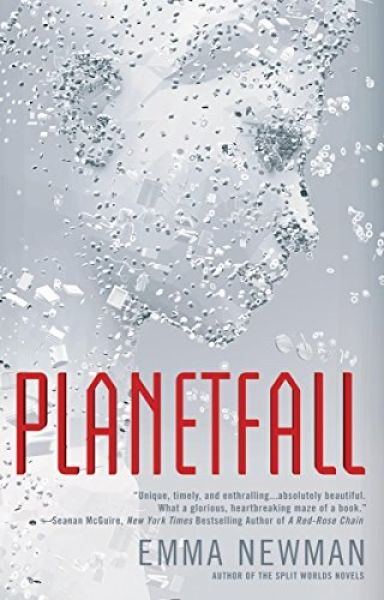Pathfinder’s Legacy
Planetfall
By Emma Newman

26 Dec, 2015
0 comments
2015’s Planetfall is Emma Newman’s fifth novel. A standalone science fiction novel, it is unrelated to her Split Worlds trilogy.
Twenty years before, the devout passengers of the starship Atlas followed the Pathfinder, Lee Suh-Mi, to a distant and surprisingly Earth-like world where, Suh assured them, God was waiting for them. Settling near an enigmatic structure that the colonists call God’s City, the colonists are still waiting for their God to reveal itself. In fact, they are still waiting for Suh to return from her first and only foray into the City.
In many ways the colony has been marking time, waiting for some external event that will utterly transform them. Now, that event looms … in the form of a wandering nomad on a world with no known natives.
Renata Ghali maintains the printer technology on which the entire settlement depends. Her unique skillset makes her valuable enough that the community tolerates her eccentricities. It is her knowledge of the secret history of the early days of the colony that makes her a threat to Suh’s successor, Mack.
A generation has passed since the Planetfall. Ren’s control of the colony’s infrastructure and her hermit-like ways have allowed her eccentricities to bloom. Despite her peculiarities, Ren is still the logical person for Mack to consult when Lee Sung-Soo wanders in from the wilderness. Ren is the one person Mack can trust to host the nomad. There is no risk that Ren will Learn Too Much; she already knows too much.
What she knows: years earlier, some members of the landing party were lost, far from God’s City. The community was told that this was an accident. and that everyone in the missing pods died in the crash. When Lee Sung-Soo arrives, it is obvious that some of the passengers survived long enough to have and raise a child.
What’s obvious to Sung-Soo is that there is something seriously wrong with Ren. And he won’t rest until he finds out what it is.
~oOo~
It’s interesting that this book deploys some of my least favourite tropes in a way that does not prevent me from enjoying (most) of this novel. For example Ren sees the Earth as horribly overcrowded, unpleasant, and possibly doomed to war (endless or final and apocalyptic). But consider: she’s not only a religious fanatic following a cult leader to a far world. she’s agoraphobic. Crowds make her profoundly uncomfortable. It is possible that her memories of Earth are just a tad unreliable.
This isn’t one of those SF novels in which an Earth on the brink of collapse somehow manages to spackle together an interstellar craft. Atlas is the biggest starship launched to date but not the first. There’s no reason to think it will be the last starship, although Suh took legal steps to delay the spread of her cult’s design innovations.
This is a rather odd example of what I once called “premature interstellarism” [1]. What makes it odd is that the colony isn’t doomed because their technology isn’t up to the task of making a habitation for humans on an alien world. It’s doomed because the cultists are a passive, incurious lot who are happy to leave the business of keeping all the wheels spinning to one troubled woman. As well, they’re very insistent on keeping their ecological footprint on the planet as tiny as possible. They refuse to expand their original settlement. That is dangerous because, as previously discussed, small communities are vulnerable to calamity. If there’s one thing utopian novels teach us, it is that the people who live in utopias are generally idiots and the people in Planetfall are no exception.
It may be wrong of me to accept “they’re self-deluded cultists being taken advantage of by a charismatic, opportunistic leader” as a valid explanation for behaviour I would criticize as implausible in another book, but in this case, it does seem sufficient.
This book works best when it is tightly focused on Ren, a fascinating, enthralling character, and when it is presenting mysteries, from who or what created the City of God to what exactly happened to Suh. Most of the book is rather compelling. Where it falls down is at the very end; the explanations are either pretty obvious (except, I guess to self-deluded cultists in thrall to a charismatic, opportunistic leader) or unsatisfactory. But the explanations are only a small part of the book; read this for Ren, not for the solutions to the mysteries.
Planetfall is available from Roc.
1: If you get the impression there are a fair number of parallels between Planetfall and Robinson’s Aurora, you would be right. There are more convincing reasons for matters to be as they are in Planetfall than there are in Aurora.
